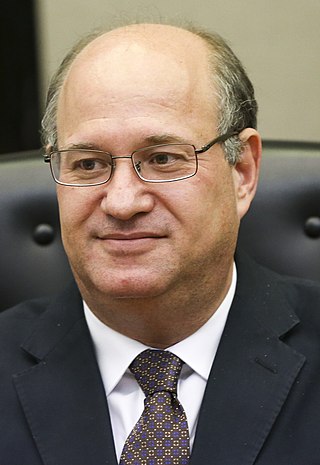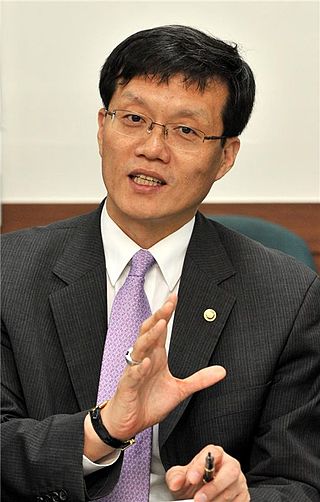
The International Monetary Fund (IMF) is a major financial agency of the United Nations, and an international financial institution funded by 190 member countries, with headquarters in Washington, D.C. It is regarded as the global lender of last resort to national governments, and a leading supporter of exchange-rate stability. Its stated mission is "working to foster global monetary cooperation, secure financial stability, facilitate international trade, promote high employment and sustainable economic growth, and reduce poverty around the world."

Marek Marian Belka is a Polish professor of economics and politician who has served as Prime Minister of Poland and Finance Minister of Poland in two governments. He is a former director of the International Monetary Fund's (IMF) European Department and former Head of Narodowy Bank Polski. He has served as a Member of the European Parliament (MEP) since July 2019.

The G20 or Group of 20 is an intergovernmental forum comprising 19 sovereign countries, the European Union (EU), and the African Union (AU). It works to address major issues related to the global economy, such as international financial stability, climate change mitigation and sustainable development.

Yi Gang is a Chinese economist who served as the governor of the People's Bank of China from 2018 to 2023, vice governor of the People's Bank of China from 2007 to 2018, director of the State Administration of Foreign Exchange from 2009 to 2015, and assistant governor of the People's Bank of China from 2004 to 2007.

Maurice Moses "Maury" Obstfeld is a professor of economics at the University of California, Berkeley and previously Chief Economist at the International Monetary Fund. He is also a nonresident senior fellow at the Peterson Institute for International Economics.

José De Gregorio Rebeco is a Chilean economist, academic, researcher, consultant and politician. He has been the Governor of the Central Bank of Chile, Minister of the Economy, Mining and Energy during the administration of Ricardo Lagos and is currently the Dean of the School of Economics and Business of the Universidad de Chile. He is also a nonresident Senior Fellow at the Peterson Institute for International Economics.
Malcolm D. Knight is a Canadian economist, policymaker and banker. He is currently Visiting Professor of Finance at the London School of Economics and Political Science and a Distinguished Fellow at the Center for International Governance Innovation. From 2008 to 2012, Knight was Vice Chairman of Deutsche Bank Group where he was responsible for developing and coordinating the bank's global approach to issues in financial regulation, supervision, and financial stability. He served as general manager of the Bank for International Settlements from 2003 to 2008 and as Senior Deputy Governor of the Bank of Canada (1999-2003), after holding senior positions at the International Monetary Fund (1975-1999).

Anne Osborn Krueger is an American economist. She was the World Bank Chief Economist from 1982 to 1986, and the first deputy managing director of the International Monetary Fund (IMF) from 2001 to 2006. She is currently the senior research professor of international economics at the Johns Hopkins School of Advanced International Studies in Washington, D.C. She also is a senior fellow of Center for International Development and the Herald L. and Caroline Ritch Emeritus Professor of Sciences and Humanities' Economics Department at Stanford University.

Beatrice Weder di Mauro is a Swiss economist who is currently Professor of economics at the Graduate Institute of International and Development Studies in Geneva, Research Professor and Distinguished Fellow-in-residence at the Emerging Markets Institute of INSEAD Singapore, and senior fellow at the Asian Bureau of Finance and Economic Research (ABFER). Since 2018, she also serves as President of the Centre for Economic Policy Research (CEPR).

Kristalina Ivanova Georgieva-Kinova is a Bulgarian economist serving as the 12th managing director of the International Monetary Fund since 2019, and the first person from an emerging market economy to lead the institution. Born in Sofia, her university education was at London School of Economics (LSE), followed by a return to her native Bulgaria where she witnessed some of the economic hardships of the post-Communist transition. She began her career by teaching economics, becoming a prominent figure in the field.
The chief economist of the International Monetary Fund (IMF) is also the economic counsellor and director of the fund's Research Department and is responsible for providing independent advice to the fund on its policy issues, integrating ideas of the research in the design of policies, conveying these ideas to the policymakers inside and outside the fund and managing all research done at IMF. The chief economist is a member of the Senior Leadership of the IMF.
Domenico Lombardi is a former director of the Global Economy program at the Centre for International Governance Innovation (CIGI), a non-partisan global governance think tank in Waterloo, Ontario, Canada. He is also chair of the Oxford Institute for Economic Policy. Until 2013 he was a senior fellow at the Brookings Institution.

Warren L. Coats, Jr., is an economist specializing in monetary policy. He retired from the International Monetary Fund in May 2003 to join the board of directors of the Cayman Islands Monetary Authority. He is president of Economic Consulting, providing technical assistance to central banks, and until recently was adviser to the central banks of Afghanistan and Kazakhstan.

Nicoletta Batini is an Italian economist, notable as a scholar of innovative monetary and fiscal policy practices. During the crisis she pioneered the IMF work exposing the dangers of excessive fiscal austerity and designed ways to consolidate public debt successfully during phases of financial deleveraging. Since 2003 at the International Monetary Fund, she has served as Advisor of the Bank of England's Monetary Policy Committee between 2000-2003 and was Professor of Economics at the University of Surrey (2007-2012), and Director of the International Economics and Policy office of the Department of the Treasury of Italy's Ministero dell’Economia e delle Finanze (MEF) between 2013-2015. Batini's fields of expertise include monetary policy, public finance, open economy macroeconomics, labor economics, energy and environmental economics, and economic modeling. She has handled extensive consultancy roles in the public sector in advanced and emerging market countries. She holds a Ph.D. in international finance from the Scuola Superiore S. Anna and a Ph.D. in monetary economics from the University of Oxford.

Liviu Voinea has been Alternate Executive Director at the World Bank since March 1st, 2024. Between august 2019 and august 2023 he was Romania's representative to the International Monetary Fund and Senior Advisor to the IMF Executive Director. In this capacity he was a member of the Executive Board of the International Monetary Fund. He also represented Montenegro to the IMF.

Ilan Goldfajn is a Brazilian economist, former governor of the Central Bank of Brazil and former director of the International Monetary Fund's Western Hemisphere Department. In December 2022, he became president of the Inter-American Development Bank.
Mexico and the International Monetary Fund are the international relations between Mexico and the International Monetary Fund (IMF). Mexico joined the IMF in 1945. As of 2022, Mexico has had 18 numbers of arraignment with the IMF.

Geoffrey William Seiji Okamoto is an American economist and government official who served as first deputy managing director of the International Monetary Fund. Okamoto previously served as the acting assistant secretary for international finance and development in the United States Department of the Treasury. He was nominated for this position on January 1, 2019, by the White House and was never confirmed by the United States Congress. He previously served as acting assistant secretary for international markets and investment, for which he was also not confirmed.

Wang Tao is a Chinese economist and expert on the Chinese economy. She is currently managing director, chief China economist and head of Asia economic research at UBS Investment Bank. She served on the Mainland Opportunities Committee of the Hong Kong Financial Services Development Council from 2016 to 2021, and is a member of the Chief China Economist Forum.

Rhee Changyong is a South Korean economist currently serving as the 26th Governor of the Bank of Korea from April 2022.
















